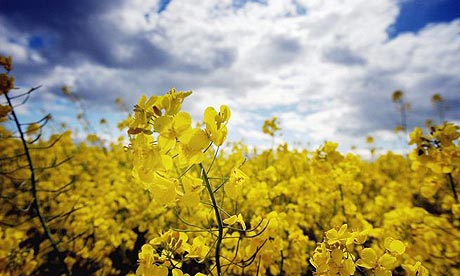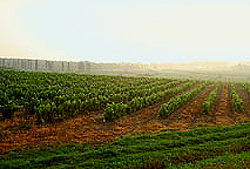Image may be NSFW.
Clik here to view.
Genetically modified oilseed rape, one of the four main commercial GM crops. Photograph: Christopher Furlong/Getty
Background: The Cartagena Protocol on Biosafety; SciDevnet GM crops and Agriculture & Environment; Monsanto vs Percy Schmeiser
Related posts and Food on Wednesday-night.com
“Harvard Development Expert: Agricultural Innovation Offers Path to Overcome Hunger”
Calestous Juma says future food needs can be met only through innovation
The world can only meet its future food needs through innovation, including the use of agricultural biotechnology, a Harvard development specialist said today.
Since their commercial debut in the mid-1990s, genetically designed crops have added about $100 billion to world crop output, avoided massive pesticide use and greenhouse gas emissions, spared vast tracts of land and fed millions of additional people worldwide, said Professor Calestous Juma of the Harvard Kennedy School’s Belfer Center for Science and International Affairs.
Speaking today to graduates of McGill University, Montreal, where he received an honorary doctorate, Juma asked youth to embrace innovative sciences that alone will make it possible to feed the billions who will swell world population in decades ahead, especially in developing countries.
And he described the importance of developing more productive or nutritious and insect-resistant crops.
25 May
Protesters march against GMO giant Monsanto in 430 cities
American agricultural giant a prime target in fight against modified foods
(CBC) The [US] Senate this week overwhelmingly rejected a bill that would allow states to require labeling of genetically modified foods.
The Biotechnology Industry Organization, a lobbying group that represents Monsanto, DuPont & Co. and other makers of genetically modified seeds, has said that it supports voluntary labeling for people who seek out such products.
But it says that mandatory labeling would only mislead or confuse consumers into thinking the products aren’t safe, even though the FDA has said there’s no difference between GMO and organic, non-GMO foods.
2012
Can science help improve food security?
(BBC) The UN Food and Agriculture Organization (FAO) latest figures showed that global food prices had risen by 1.4% in September as a result of fears of food shortages following poor harvests.
Projections of future changes to the planet’s climate and its impact on the agriculture sector’s ability to feed a rising global population has made the issue a priority for scientists.
The challenge of using crop varieties available to farmers to feed the world’s growing population in a rapidly changing climate was “humanity’s greatest challenge in the 21st Century”, according to Colin Osborne, a reader in plant biology at the University of Sheffield’s Department of Animal and Plant Sciences.
“We need to increase crop yields using less land, irrigation and fertiliser,” he explained.
Plant scientists involved in the university’s Project Sunshine are looking for “innovative new solutions to these problems”, Dr Osborne added. (11 October)
Genetically Modified Organisms (Environment Canada 2011)
Image may be NSFW.
Clik here to view. Canada is the third largest producer of genetically modified organisms (GMOs) in the world. As the cultivation of GMO crops intensifies and expands, ecological risks are emerging, such as superweeds, pest resistance, and adverse effects on non-target organisms. GMO animals such as fish are also being developed, raising additional concerns about potential environmental risks. As yet, there is little information available on the potential adverse effects of GMOs on aquatic ecosystems.
Canada is the third largest producer of genetically modified organisms (GMOs) in the world. As the cultivation of GMO crops intensifies and expands, ecological risks are emerging, such as superweeds, pest resistance, and adverse effects on non-target organisms. GMO animals such as fish are also being developed, raising additional concerns about potential environmental risks. As yet, there is little information available on the potential adverse effects of GMOs on aquatic ecosystems.
Environmental scientists do not yet know what long-term impacts on biodiversity and ecosystem function could result from dispersing GMOs and related products such as herbicides and Bt toxins (Bacillus thuringiensis toxins) in the environment, what effects they could have on indigenous microorganisms and invertebrates in streams and soils, and what threats they might pose to water quality.
26 April 2010
GM Crops Go to US High Court, Environmental Laws on the Line
(IPS) “The issue here then becomes how amenable is the Supreme Court going to be in terms of allowing citizens to bring suit against an agency that is not doing its job”.
But the legal implications are only half the story. Also implicated, at least potentially, is the future of GM crops in the U.S. and elsewhere.
In the original court case, organic farmers argued that the genes of the GM alfalfa would be carried to neighbouring – potentially miles away – non-GM alfalfa by the bees that pollinate the crop and that genetic contamination would hurt their ability to market their alfalfa under the label “organic”. This would also preclude them from exporting to countries that prohibit GM crops.
“Consumers may not accept products cross-contaminated with genetically-engineered components and you can test for those and testing is done pretty routinely and therefore the market could reject the contaminated organic crops”. In addition to this economic impact, they have argued that the planting of the Roundup Ready alfalfa that is at issue here, used in conjunction with the Monsanto-made herbicide Roundup, may also lead to increased herbicide-resistance in weeds.
2008
24 May
Sowing seeds of discontent
Since the dawn of civilization, farmers have saved seeds from the harvest and replanted them the following year.
(The Gazette) But makers of genetically modified (GM) seeds – introduced in 1996 and now grown by some 70,000 Canadian farmers, according to Monsanto – have been putting a stop to that practice.
Genetically modified seeds – also known as genetically engineered – are altered to make them resistant to pests, diseases or herbicides.
The 12 million farmers worldwide who will plant GM seeds this year sign contracts agreeing not to save or replant seeds. That means they must buy new seeds every year.
Critics charge such contracts confer almost unlimited power over farmers’ lives to multinational companies whose priority is profit. From India, where thousands of debt-ridden farmers have committed suicide, to Latin America, where monoculture crops have destroyed forest and evicted small growers, they say GM seeds are sowing a humanitarian and ecological disaster.
The debate over GM seeds has come into sharp focus as the world faces a food-price crisis that threatens to push millions into starvation.
22 May
BRAZIL: Agribusiness Undermines Environmental Leadership Role
RIO DE JANEIRO, May 22 (IPS) – Brazil is a world leader in agriculture and on several environmental issues, but it will find it hard to reconcile both fronts, judging by the many battles lost by former environment minister Marina Silva, in spite of the political clout she wielded for over five years.
The advantages enjoyed by agriculture in this country are not limited to the availability of vast amounts of land and water, and a favourable climate. Brazil has developed technology and practices that have greatly increased crop yields, and made it an unbeatable exporter of a large number of products.
Brazil is a top producer of sugar, coffee, meats, ethanol, orange juice and soybeans. Output of grains has doubled in a decade, and it has surpluses of rice and maize, which it used to import a few years ago. Now it is dependent on imports of only one commodity for mass consumption: wheat.
Today, the boom of the biofuels industry and the soaring international prices of foods are encouraging Brazil to accelerate the expansion of its agricultural frontier, to the despair of environmentalists, because of encroachment on the Amazon rainforests and other ecosystems like the Cerrado, a vast, highly biodiverse savannah in the centre of the country.
20 May
Biodiversity key to tacking global food crisis: UN agency
FAO says that less genetic diversity means that there are fewer opportunities for the growth and innovation needed to boost agriculture at a time of soaring food prices.
TEHRAN (UNIC) — Just 12 crops and 14 animal species provide most of the world’s food, and this lack of diversity means that the food supply has become more vulnerable and less sustainable — according to the United Nations Food and Agriculture Organization (FAO).
“The erosion of biodiversity for food and agriculture severely compromises global food security,” FAO Assistant Director-General Alexander Müller said Monday. “We need to strengthen our efforts to protect and wisely manage biodiversity for food security,” he added.
Speaking at the beginning of a global conference on the Convention on Biological Diversity (CBD) in Bonn, Germany, Mr. Müller called on the international community to intensify its commitment to integrating food security and biodiversity concerns.
2 April
GM seeds can ‘last for 10 years’
(BBC) Researchers in Sweden examined a field planted with experimental oilseed rape a decade ago, and found transgenic specimens were still growing there.
This was despite intensive efforts in the intervening years to remove seeds.
Image may be NSFW.
Clik here to view.
28 February
A vast underground vault storing millions of seeds from around the world took delivery of its first shipment Tuesday.
Dubbed the “Doomsday Vault” ,the seed bank on a remote island near the Arctic Ocean is considered the ultimate safety net for the world’s seed collections, protecting them from a wide range of threats including war, natural disasters, lack of funding or simply poor agricultural management.
26 February
”Doomsday” Seed Vault Opens Near North Pole (see photo above)
(National Geographic) The “doomsday” vault is designed to keep millions of seed samples safe from natural and unnatural disasters: global warming, asteroid strikes, plant diseases, nuclear warfare, and even earthquakes—in fact, the structure absorbed a magnitude 6.2 quake here last week without a crack.
Though Norway owns the global seed bank—the first of its kind—other countries can store seeds in it and remove them as needed. The genes in the seeds may someday be needed to adapt crops to endure climate change, droughts, blights, and other potential catastrophes.
13 February 2008
Worldwide increase in GM crops, report shows
The global use of GM crops increased by 12% last year to reach 114m hectares across 23 countries, a report showed today.
(The Guardian) Around 11 million out of the 12 million farmers now growing biotech crops are “resource-poor”, according to the International Service for the Acquisition of Agri-biotech Applications (ISAAA).
The report claimed that growing GM plants such as maize and cotton, which ISAAA said produced higher yields and incomes and involved lower pesticide use, helps small farmers gain financially and provides social benefits such as higher school enrolment as a result of growing.
But while the report’s author, Clive James, said GM crops would be increasingly important for cutting poverty and hunger by 2015, Friends of the Earth claimed biotech farming was not delivering on the promised benefits.
4 December 2007
A negative – if not paranoid – view of the Seed Vault from Global Research
“Doomsday Seed Vault” in the Arctic
Bill Gates, Rockefeller and the GMO giants know something we don’t
Can the development of patented seeds for most of the world’s major sustenance crops such as rice, corn, wheat, and feed grains such as soybeans ultimately be used in a horrible form of biological warfare?
November 28, 2007
Science adviser urges GM rethink
[Sir David King] believes there is a moral case for the UK and the rest of Europe to grow GM crops, and thinks Europe’s backing would kick-start a technology that could help the world’s poorest in Africa.
He says GM crops will be essential to deal with an ever-growing population and diminishing water supplies.
Sir David’s comments have generated a large reaction from environmental campaigners, agricultural institutes and biotechnology scientists.
Friends of the Earth’s GM campaigner, Clare Oxborrow, responded by saying GM crops are not the solution to feeding an expanding population: “[GM has] failed to deliver the sustainable solutions that are urgently needed.”
She added: “The main benefits they have brought are to the handful of multinational companies who have gained an increased control of the food system and have disempowered small farmers all over the world, especially in developing countries.”
Others, however, welcomed Sir David’s intervention.
The National Institute of Agricultural Botany (NIAB) hopes Sir David’s endorsement will be heeded by the nation.
Professor Wayne Powell, NIAB’s chief executive, said: “GM technology is crucial as the way forward to help feed the world.”
He also echoed Sir David’s thoughts that the UK could be at the forefront of exploiting this technology.
“We have the scientific skills and I have every confidence that our scientists could lead the way in this.”
August 22, 2007
Governments duped over GM food crops
Most Australian states have started reviews of their 2004 GM Acts which carry a de facto moratorium on growing genetically modified (GM) crops. The pro-GM lobby has responded with an orchestrated campaign.
February 9
(BBC) The final design for a “doomsday” vault that will house seeds from all known varieties of food crops has been unveiled by the Norwegian government.
The vault aims to safeguard the world’s agriculture from future catastrophes, such as nuclear war, asteroid strikes and climate change.
IN RECENT YEARS Canadians have become more and more concerned about the origins of their food and the environmental impacts of pesticides in agriculture. What is less well known is that pesticide corporations such as Monsanto and Du Pont have bought their way into the seed industry and are taking control of what was once the exclusive domain of farmers. Good Crop/Bad Crop Seed Politics and the Future of Food in Canada